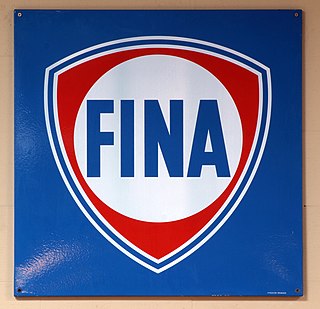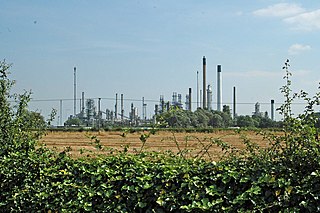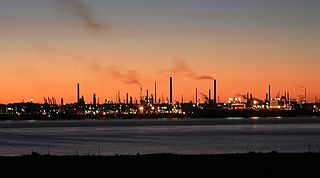
Petrofina was a Belgian oil company. It merged with Total in 1999 to form TotalFina, which after subsequent mergers has changed its name back to Total. In the United States, Fina's former refining and marketing operations are now owned by Delek US.

Elf Aquitaine is a French brand of oils and other motor products for automobiles and trucks. Elf is a former petroleum company which merged with TotalFina to form "TotalFinaElf". The new company changed its name to Total in 2003 and TotalEnergies in 2021. Elf has been as a major brand of TotalEnergies since then.

Stanlow Refinery is an oil refinery owned by Essar Energy in Ellesmere Port, North West England. Until 2011, it was owned by Shell UK. The refinery is situated on the south bank of the Manchester Ship Canal, which is used to transport seaborne oil for refining and chemicals for Essar.

Kochi Refinery Limited (KRL) is a crude oil refinery in the city of Kochi in Kerala, India. It is the largest public sector refinery in India with a production capacity of 15.5 million tonnes per year. Formerly known as Cochin Refineries Limited and later renamed as Kochi Refineries Limited, it was acquired by Bharat Petroleum Corporation Limited in the year 2006. The refinery is situated at Ambalamugal, around 12 km (7.5 mi) east of the city centre.

The Humber Refinery is a British oil refinery in South Killingholme, North Lincolnshire. It is situated south of the railway line next to the A160; Prax Group's Lindsey Oil Refinery is north of the railway line.

The Llandarcy Oil Refinery, also known as the National Oil Refinery, BP Llandarcy and Skewen refinery, was the United Kingdom's first oil refinery, initially opened by the Anglo-Persian Oil Company on 29 June 1922, although operations had begun on 1 July 1921. Before this, the only oil refined in the UK came from Scottish shale.
Prax Lindsey Oil Refinery is an oil refinery in North Killingholme, North Lincolnshire, England owned and operated by the Prax Group. It lies to the north of the Humber Refinery, owned by rival oil company Phillips 66, and the railway line to Immingham Docks. Immingham Power Station, owned by VPI Immingham, provides the electricity and heat for the fractionation processes.
INA-Industrija nafte, d.d. is a Croatian multinational oil company. INA Group has leading role in Croatia's oil business, a strong regional position in the oil and gas exploration and production, oil processing, and oil product distribution activities. INA, d.d. is a stock company with the Hungarian MOL Group and the Croatian Government as its biggest shareholders, while a minority of shares is owned by private and institutional investors. INA shares have been listed at the London and Zagreb stock exchanges since December 1, 2006. INA Group is composed of several affiliated companies wholly or partially owned by INA, d.d.. The Group has its headquarters in Zagreb.

Coryton Refinery was an oil refinery in Essex, England, on the estuary of the River Thames 28 miles (45 km) from central London, between Shell Haven Creek and Hole Haven Creek, which separates Canvey Island from the mainland.

Marsden Point Oil Refinery was a 96,000 BPD refinery located at Marsden Point, Whangārei, Northland, New Zealand. It was the only oil refinery in New Zealand, and was operated by Refining NZ.

Fawley Refinery is an oil refinery located at Fawley, Hampshire, England. The refinery is owned by Esso Petroleum Company Limited, a subsidiary of Exxon Mobil Corporation, which acquired the site in 1925. Situated on Southampton Water, it was rebuilt and extended in 1951 and is now the largest oil refinery in the United Kingdom, and one of the most complex refineries in Europe. With a capacity of 270,000 barrels (43,000 m3) per day, Fawley provides 20 per cent of the UK's refinery capacity. Over 2,500 people are employed at the site.

The BPRefinery (Kent) was an oil refinery on the Isle of Grain in Kent. It was commissioned in 1953 and had a maximum processing capacity of 11 million tonnes of crude oil per year. It was decommissioned in August 1982.

Erg S.p.A., acronym for Edoardo Raffinerie Garrone, is an Italian energy company, founded in 1938, and based in Genoa, Italy.

The Feyzin disaster occurred in a refinery near the town of Feyzin, 10 kilometres south of Lyon, France, on 4 January 1966. An LPG spill occurred when an operator was draining water from a 1,200m³ pressurised propane tank. The resultant cloud of propane vapour spread, until it was ignited by a car on an adjoining road. The pool of propane in the bund caused the storage tank to be engulfed in flames, which produced a Boiling Liquid Expanding Vapour Explosion (BLEVE) when the tank ruptured. This resulted in a fireball which killed and injured firemen and spectators. Flying missiles broke the legs of an adjacent sphere which later BLEVE'd. Three further spheres toppled due to the collapse of support legs which were not adequately fire protected. These vessels ruptured but did not explode. A number of petrol and crude oil tanks also caught fire. The conflagration took 48 hours to bring under control. This incident resulted in the deaths of 18 people, the injury of 81 and extensive damage to the site.

Milford Haven Refinery was an oil refinery situated on the Pembrokeshire coast in Wales, United Kingdom. The refinery began operating in 1973 under Amoco's ownership, but in its final years it was owned by Murco Petroleum. The closure of the refinery was announced in November 2014. The site was sold to Puma Energy in 2015 for use as a petroleum storage and distribution terminal.

The Tema Oil Refinery (TOR) is one of two crude oil refineries in Ghana. In 1977, the Government of Ghana became the sole shareholder. The name of the refinery was changed to the Tema Oil Refinery in 1991. The refinery was first named the Ghanaian Italian Petroleum Company (GHAIP).
The South European Pipeline is a crude oil pipeline system in France, Switzerland, and Germany. It is built and operated by Société du pipeline sud-européen. The system supplies crude oil to refineries in Feyzin, Cressier, Reichstett, and Karlsruhe.
Niger has a long history of petroleum exploration dating back to the 1970s. However, it is only since 2011 with the opening of the Agadem oilfield and the Soraz refinery near Zinder that petroleum is being produced in Niger. The oil and gas extracted from the Agadem field are processed at the Soraz refinery. The refined products are primarily for domestic consumption. Since the beginning of oil extraction, it appears that the reserves have been underestimated: from an estimate of 324 million barrel reserves in 2008, it is believed that reserves are three times higher, near 1 billion barrels in 2013.
The history of the petroleum industry in France covers the exploitation of petroleum in its relation to the economy of France.

Lavéra Refinery is an oil refinery complex located 30 miles west of Marseilles, France, on the Mediterranean Sea. It is currently operated by Petroineos.

















